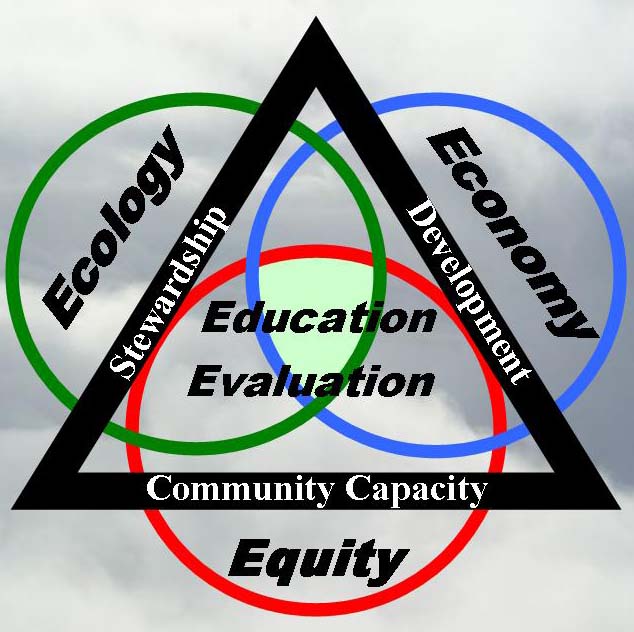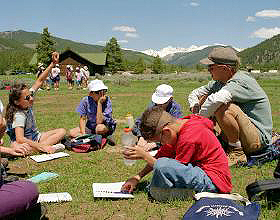|
Global
sustainable development action has not progressed as
many would have hoped. People frequently recite the word "sustainable" as
though saying it often enough will solve our problems. Although
legislation, regulations, and other public policies must support
sustainability, progress in achieving it really comes down
to changes in social behavior at the community, grassroots,
and individual level. The
shift that must occur is one of bringing awareness and understanding
to the people who can make the most difference, the average
global citizen, in a context that decodes and de-mystifies
the science behind potential solutions.
Through
their daily purchases, individuals hold considerable
sway over the health and stability of the world’s
most fragile ecological systems, according to the World
Watch Institute. If alternative choices are presented
to the consumer and enough demand is generated, entire
markets can shift. Consider the great shifts over recent
years in public attitudes about diet, exercise, fitness,
preventive health, and wellness; or about pollution,
global warming, and atmospheric ozone depletion. Such
agendas have begun to sink in.
We
can identify the underlying driving forces of consumption
and use this knowledge to raise awareness throughout
society of the importance for sustainable lifestyles.
Instead of “preaching” the
environment message, we can use social
marketing research
to create a more informed consumer that is aware of the
choices available and their impacts.
But it is becoming
apparent that "interdisciplinary
scientific information (like that required to promote
sustainable lifestyles) will not serve the public unless
the knowledge gained can be communicated effectively
to policymakers and stakeholders at all levels of the
social and political spectrums" ..... We need "to
improve the process of information dissemination, from
scientist to citizen and vice versa" (National
Science Foundation Workshop "Nature and Society" -
June 2000).
We recognize the need
for a new kind of professional able to promote effective
research and development in the practice of sustainability,
as welll as the abilities of community members to be aware
of sustainability potential and outcomes. We work with
educational institutions and organizations in promoting
integrated and holistic educational approaches to the practice
of sustainable development, no matter what the area of
focus. And part of this new approach to sustainability
awareness can be met by enhanced educational
strategies.
In our quickly advancing technology and information age,
it
is
becoming
imperative that education focus upon encouraging
learners to "think outside the traditional box" if
they are to fit into the technological society of tomorrow,
be successful adults, and have the ability to achieve
a sustainable future through informed and effective decision-making.
For example, one of our recent educational initiatives has involved the design
and teaching of a course entitled "Introduction
to Sustainability in Business" for the Bainbridge Graduate Institute (Seattle,
WA).
A
new paradigm needs to evolve for learning that emphasizes
a Sustainability-Oriented Education, enhancing the ability
of citizens and professionals to think across disciplines
and boundaries. We have begun this process by exploring
the many different Sustainability
Competencies that a
practitioner in area of sustainable development should
possess in the way of Knowledge, Skills,
& Attributes
(KSA). Five
E's Unlimited has also developed significant expertise
in designing and implementing a number of different components
related to environmental and sustainability education
programs. WE CAN HELP YOU IN THE FOLLOWING WAYS.
- Incorporate
environmental and sustainability literacy subject matter
into traditional education programs.
- Reach
across institutional boundaries and teaching disciplines
in tailoring environmental education and communication
approaches to the specific context of a group's self-defined
goals, or the specific circumstances of an environmental
issue.
- Develop
new curricula at the high school or university level
that integrate the economic, ecologic, and social well-being
issues of sustainability.
- Conduct
faculty development programs in environmental and sustainability
literacy education.
- Design
life-long learning public awareness programs to assist
people in gaining a better understanding for what sustainable
lifestyles are all about.
- Support
your use of environmental education and communication
strategies, methods, and tools to strengthen community
or organization efforts at reaching their environmental
objectives.
- Increase
the legitimacy of your environmental policies and programs.
Check
out our different
sustainability
education and awareness projects and discover what
we can do for you.
|


